Essential Bible Studies
The Essential Bible Studies podcast is an introductory discussion around Biblical first principles. The Bible is a complex book. It’s easy to misunderstand and get off track if you don’t grasp its basic teachings. The show engages in key passages and unpacks them in a lively conversation to reveal how they touch on our core beliefs. Your hosts bring with them years of experience as presenters from the Learn to Read the Bible Seminars. Hosted by the Book Road Christadelphians.
The Essential Bible Studies podcast is an introductory discussion around Biblical first principles. The Bible is a complex book. It’s easy to misunderstand and get off track if you don’t grasp its basic teachings. The show engages in key passages and unpacks them in a lively conversation to reveal how they touch on our core beliefs. Your hosts bring with them years of experience as presenters from the Learn to Read the Bible Seminars. Hosted by the Book Road Christadelphians.
Episodes

Monday Feb 17, 2025
The Devil Destroyed
Monday Feb 17, 2025
Monday Feb 17, 2025
Having completed our study on the word Satan, Tim and Darryl continue by discussing how the term "devil" as used in Scripture. One of the most fascinating passages talks about how Jesus destroyed the devil. Listen in as several Bible passages weave together to complete the connection between the devil and sin which Jesus overcame in his death and resurrection.
Key Verse:
“Since therefore the children share in flesh and blood, he himself likewise partook of the same things, that through death he might destroy the one who has the power of death, that is, the devil.” (Heb. 2:14)
Outline:
Introduction
The word “devil” defined
Where the word is translated (1 Tim. 3:11,6-7; 2 Tim. 3:3; Titus 2:3) or not (John 6:70)
Key verse Heb. 2:14
Reading Heb. 2:14 in context and bringing out the details
What did Jesus accomplish in his death (Heb. 9:28)
Comparing with 1 John 3:5,8 where “take away our sins” = “destroy the works of the devil”
Is sin personified as the devil in Heb. 2:14?
Personification in Romans 5-8
Destroyed the body of sin (Rom. 6:6) so that we might be free from bondage (Rom. 6:8 cp. Heb. 2:15)
Personification of sin reigning in Rom. 6:12-22
Sin has the power of death (Rom. 6:23)
Personification in 1 Cor. 15
Death by man (1 Cor. 15:21-22)
Death destroyed (1 Cor. 15:24-28)
The power of sin (1 Cor. 15:55-57)
Conclusion
Follow us on... Facebook: https://www.facebook.com/essentialbiblestudies Instagram: https://www.instagram.com/essentialbiblestudies/ X: https://x.com/bible_podcast Get it... Get an invite to our Tuesday night Bible Studies at essentialbiblestudies.org Request a free Essential Bible Studies media kit
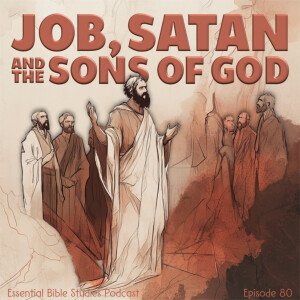
Monday Feb 10, 2025
Job, Satan and the Sons of God
Monday Feb 10, 2025
Monday Feb 10, 2025
Last week, we saw that many of the passages that use the word "satan" refer to human beings as adversaries. Is Satan in the book of Job another instance of this? Many people conclude that Satan is an angel? We are very pleased to have Dev Ramcharan with us to help identify the adversary of Job. Listen in and weigh the evidence for yourself.
Key Verse:
“Now there was a day when the sons of God came to present themselves before the LORD, and Satan also came among them.” (Job 1:6)
Outline:
Introduction
Review of last podcast on Satan
Background of Job
Who are the sons of God?
Humans in 1 John 3:1; John 1:12; Deut. 14:1
What about angels in Job 38:7?
Who are the sons of God in Genesis 6:4
Is this in heaven or on earth?
The word “heaven” is not used
“Present themselves before the Lord” (Josh 24:1; 1 Sam. 10:19; Judges 20:2; Deut. 31:14)
Who is the Satan?
Is Satan a name?
The discourse of God and Satan and what he’s allowed to do (1:12-19; 2:3)
Job attributed the evil to God (1:21; 2:10; 19:21; 42:11)
Conclusion
Follow us on... Facebook: https://www.facebook.com/essentialbiblestudies Instagram: https://www.instagram.com/essentialbiblestudies/ X: https://x.com/bible_podcast Get it... Get an invite to our Tuesday night Bible Studies at essentialbiblestudies.org Request a free Essential Bible Studies media kit
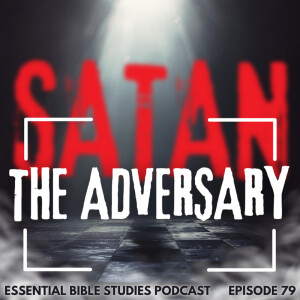
Monday Feb 03, 2025
Satan the Adversary
Monday Feb 03, 2025
Monday Feb 03, 2025
Our study of Satan begins as a word study. Join Jacob and Tim in this lively conversation as they find out the definition of the Hebrew word "satan" and some surprising ways it is translated. By the end, there is a good foundation for carefully considering the context in which Satan is mentioned and who or what it could be. You'll never look at this word Satan the same way again.
Reference Material:
The Englishman's Concordance listing mentioned in the podcast providing every occurrence of the word satan and diabolos can be download from these links for Hebrew and Greek.
Key Verse:
“And Peter took [Jesus] aside and began to rebuke him, saying, “Far be it from you, Lord! This shall never happen to you.” But [Jesus] turned and said to Peter, “Get behind me, Satan! You are a hindrance to me. For you are not setting your mind on the things of God, but on the things of man.” (Matt. 16:22-23)
Outline:
Introduction
Review of concordances
The word “satan” and its definition
The need to study this word systematically and carefully
Satan in the OT
Num. 22:22,32 – The first occurrence that of the angel of Yahweh
The next six occurrences are all human (1 Sam. 29:4; 2 Sam. 19:22; 1 Kings 5:4; 11:14,23,25).
Psalms examples (Psa. 109:6 individual; Psa. 38:20 group)
The curious case of comparing 1 Chr. 21:1 with 2 Sam. 24:1
Deferring for another episode Job and Zech 3:1-2
Satan in the NT (Examples of the same)
Individuals who set their minds on the things of men in opposition to God
Matt. 16:21-23 – Peter “set his mind” (ESV)
Acts 5:1-5 – Annanias and Sapphira contrived in their hearts
Collectively those opposed to the truth
1 Thess. 2:14-18, the satan of v. 18 defined in v. 14-16
Rev. 2:9-10,13 (cp. 3:9) – The opposition of Jewish and Roman authorities
Rev. 20:2,7 Understanding the Satan as the kingdoms of men in opposition to God’s kingdom (Rev. 11:15)
Conclusion
Follow us on... Facebook: https://www.facebook.com/essentialbiblestudies Instagram: https://www.instagram.com/essentialbiblestudies/ X: https://x.com/bible_podcast Get it... Get an invite to our Tuesday night Bible Studies at essentialbiblestudies.org Request a free Essential Bible Studies media kit
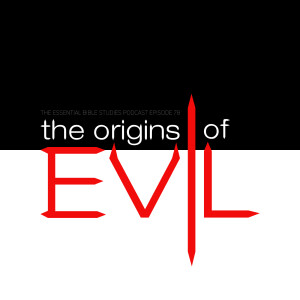
Monday Jan 27, 2025
The Origins of Evil
Monday Jan 27, 2025
Monday Jan 27, 2025
In this episode Wayne and Tim dive into the perplexing question of the source of evil. What does the Bible tell us about its origins? Does it come from angels, men and/or God? The answers uncovered in scriptural examples challenge the conventional understanding of good versus evil. Join in the conversation as we establish an important foundation for our future studies concerning Satan, the Devil and Demons.
Key Verse:
“I form the light, and create darkness: I make peace, and create evil: I the LORD do all these things.” (Isaiah 45:7)
Previous Podcasts:
Sin Entered the World
The Work of the Angels
Outline:
Introduction
Definition and Types of Evil – Moral and Natural (Jer. 26:3)
What is the cause? An angel, men or God?
God
God a source of natural evil (Isa. 45:5-7; Deut. 32:39; Job 2:10; 42:11). The false notion of God is good, Satan is evil.
God the only source of power (Psa. 62:11; Lam. 3:37-38; John 19:10-11; Rom. 13:1)
Only one God (John 17:3; Isa. 43:10-11; 44:8; 1 Thess. 1:9)
Mankind
The source of moral evil. Where does temptation come from (James 1:13-16; Mark 7:20-23; Rom. 7:18-21; Ecc. 9:3)
Man’s freewill, the knowledge of good and evil (Gen. 2:16-17)
The natural state of the hearts of men (Gen. 6:5; Jer. 17:9-10)
Angels
God is in control of the angels (Dan. 4:35; Psa. 103:20-21; Heb. 1:13-14).
They do his will whether it be good or natural evil (Psa. 78:49; 1 Sam. 24:15-17; 1 Kings 22:19-23; Judges 9:23; 1 Sam. 16:14)
Reading a quote that raises deeper questions. Can angels be a source of moral evil? Do angels have free will? Are they tempted like men?
Conclusion – Future episodes covering this topic
Follow us on... Facebook: https://www.facebook.com/essentialbiblestudies Instagram: https://www.instagram.com/essentialbiblestudies/ X: https://x.com/bible_podcast Get it... Get an invite to our Tuesday night Bible Studies at essentialbiblestudies.org Request a free Essential Bible Studies media kit
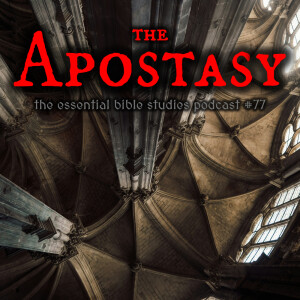
Monday Jan 20, 2025
The Apostasy
Monday Jan 20, 2025
Monday Jan 20, 2025
Tim and Jay follow up on a question from last season about the church and the holy spirit gifts. The answer leads on a fascinating study of the prophecies concerning a falling away from Apostolic teaching. Prophecies that surprisingly came to pass in the Apostle's day and are still with us.
Key Verse:
"Preach the word; be ready in season and out of season; reprove, rebuke, and exhort, with complete patience and teaching. For the time is coming when people will not endure sound teaching, but having itching ears they will accumulate for themselves teachers to suit their own passions, and will turn away from listening to the truth and wander off into myths." 2 Timothy 4:2-4
Outline:
Introduction
Review of “perfect” (1 Cor. 13:8-10; Eph. 4:13-14) in the Ages of the Spirit episode and the question
The body of Christ vs the Apostasy
Define Apostasy
The Lord knows who are his (2 Tim. 2:19)
Apostasy Foretold
Acts 20:28-32 (ref. Matt. 7:15-20)
From without and within
The warning to be alert (Rom. 16:17-19)
Signs of the Apostasy
1 Tim. 4:1-3 – Doctrines of demons, forbidding to marry, abstinence from foods
2 Tim. 4:2-4 – Wander into myths
2 Pet. 2:1-3 – Emphasis on greed and sensuality
Apostasy Started
Jude 1:3-4 – Fulfillment of 2 Peter passage
1 John 2:18-19 – The beginning of the antichrist
1 John 4:1-6 – Testing the spirits of truth and error
2 Thess. 2:1-12
The rebellion comes first and was already at work
Would last to the coming of Christ
Conclusion
Follow us on... Facebook: https://www.facebook.com/essentialbiblestudies Instagram: https://www.instagram.com/essentialbiblestudies/ X: https://x.com/bible_podcast Get it... Get an invite to our Tuesday night Bible Studies at essentialbiblestudies.org Request a free Essential Bible Studies media kit
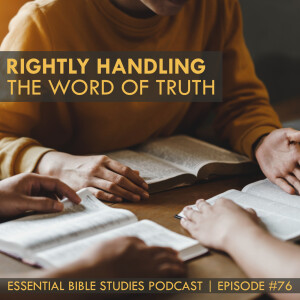
Monday Jan 13, 2025
Rightly Handling the Word of Truth
Monday Jan 13, 2025
Monday Jan 13, 2025
For the kick off of Season 7, we are very pleased to have Jason Hensley joining us. Jason shares the awkward moment that challenged how he read the Bible. This drove him to write a book called "The Bible in Context". We review the important points of his book and undergo some paradigm shifts along the way. The result is a whole new way of reading the Bible in context.
Key Verse:
“Do your best to present yourself to God as one approved, a worker who has no need to be ashamed, rightly handling the word of truth.” (2 Tim. 2:15)
Outline:
Introduction
Determining Intent
The challenges of interpreting the Bible
The importance of context and the author’s intent (2 Peter 3:15-16 cp. 2 Tim. 2:15) and God’s intent
Recognizing bias and the importance of learning in a community
Historical Content
Cultural, contemporary, geographical
Example of Psa. 121:1
Determining historical context
Literary Content
The immediate verses (Example of Lucifer Isa. 14:12)
Context of a book
The Biblical Content and Divine Intent
Example of demons
Meaning beyond the author (1 Peter1:11)
Principles and Applications
Study and application
Principles defined
Example of Satan vs God’s Sovereignty
Conclusion
Jason Hensley links
Webpage: https://www.jasonhensley.net/
Get the book on Amazon: The Bible in Context
Follow us on... Facebook: https://www.facebook.com/essentialbiblestudies Instagram: https://www.instagram.com/essentialbiblestudies/ X: https://x.com/bible_podcast Get it... Get an invite to our Tuesday night Bible Studies at essentialbiblestudies.org Request a free Essential Bible Studies media kit

Tuesday Dec 17, 2024
Season 7 Trailer
Tuesday Dec 17, 2024
Tuesday Dec 17, 2024
The Essential Bible Studies podcast season seven premiers on January 13th, 2025!
Follow us on... Facebook: https://www.facebook.com/essentialbiblestudies Instagram: https://www.instagram.com/essentialbiblestudies/ X: https://x.com/bible_podcast Get it... Get an invite to our Tuesday night Bible Studies at essentialbiblestudies.org Request a free Essential Bible Studies media kit

Monday Apr 08, 2024
Testimony and Reflections Season 6
Monday Apr 08, 2024
Monday Apr 08, 2024
Jesse grew up in a Pentecostal church but later in his teens started to drift away with the prospects of a career in hockey. One simple conversation became the catalyst for him to consider his life's path and begin a journey to discover the truth of God's word.
Key Verse:
"Therefore remember that at one time you Gentiles in the flesh, called “the uncircumcision” by what is called the circumcision, which is made in the flesh by hands— remember that you were at that time separated from Christ, alienated from the commonwealth of Israel and strangers to the covenants of promise, having no hope and without God in the world. But now in Christ Jesus you who once were far off have been brought near by the blood of Christ." (Ephesians 2:11-13)
Follow us on... Facebook: https://www.facebook.com/essentialbiblestudies Instagram: https://www.instagram.com/essentialbiblestudies/ X: https://x.com/bible_podcast Get it... Get an invite to our Tuesday night Bible Studies at essentialbiblestudies.org Request a free Essential Bible Studies media kit
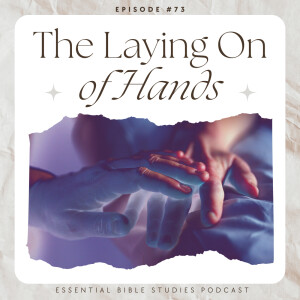
Monday Apr 01, 2024
The Laying on of Hands
Monday Apr 01, 2024
Monday Apr 01, 2024
This may seem like a strange topic for an essential Bible study, but hopefully everything will become clear as we dig into the Scriptures.
Key Verse:
Hebrews 6:1-2 “Therefore let us leave the elementary doctrine of Christ and go on to maturity, not laying again a foundation of repentance from dead works and of faith toward God, and of instruction about washings, the laying on of hands, the resurrection of the dead, and eternal judgment.”
Outline:
Introduction
Why would we consider this as an essential study? From our first podcast “Defining Essential Bible Studies” and Hebrews 6:2
Letting the Bible leads us in our studies
Four aspects to laying on of hands
Blessing
the first instance with Jacob and his grandsons (Gen. 48:14)
Jesus on the children (Matt. 19:13-15)
Sacrifice and association
The day of atonement (Lev. 16:21)
The people and the Levites (Num. 8:10,12)
Commissioning
Moses to Joshua (Num. 27:18,23; Deut. 34:9)
The Apostles on Stephen (Acts 6:6)
The Antioch Ecclesia on Paul and Barnabas (Acts 13:3)
Healing and miraculous Holy Spirit gifts
Healing by Jesus (Luke 4:40) and the Apostles (Acts 28:8)
Transfer of the Holy Spirit gifts by Apostles (Acts 8:17-19; 19:6)
Timothy (1 Tim. 4:14; 2 Tim. 1:6)
Which one is Heb. 6:2 referring to?
The purpose of the Holy Spirit gifts
Conclusion
Follow us on... Facebook: https://www.facebook.com/essentialbiblestudies Instagram: https://www.instagram.com/essentialbiblestudies/ X: https://x.com/bible_podcast Get it... Get an invite to our Tuesday night Bible Studies at essentialbiblestudies.org Request a free Essential Bible Studies media kit
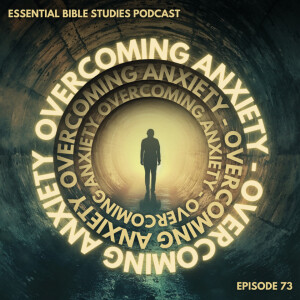
Monday Mar 25, 2024
Overcoming Anxiety
Monday Mar 25, 2024
Monday Mar 25, 2024
Worry, anxiety and depression touch our lives in one way or another. It can have a crippling effect on our walk of faith. What advice did Jesus have for overcoming it? Where can we turn for help? The Bible has a lot to say about mental health matters. Joel Suntz and Tim Young begin with the basics of anxiety from a Biblical perspective. Joel then provides three ways to overcome it---developing faith, praying and helping others. Simple things that are hard to do.
Key verse:
"Therefore I tell you, do not be anxious about your life, what you will eat or what you will drink, nor about your body, what you will put on. Is not life more than food, and the body more than clothing?" Matthew 6:25
Follow us on... Facebook: https://www.facebook.com/essentialbiblestudies Instagram: https://www.instagram.com/essentialbiblestudies/ X: https://x.com/bible_podcast Get it... Get an invite to our Tuesday night Bible Studies at essentialbiblestudies.org Request a free Essential Bible Studies media kit
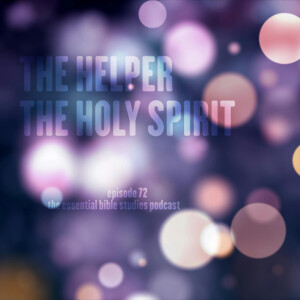
Monday Mar 18, 2024
The Helper, The Holy Spirit
Monday Mar 18, 2024
Monday Mar 18, 2024
In our last study, we ended with the question "Is the Holy Spirit a person?" A series of passages in the Gospel of John chapters fourteen to sixteen would seem to indicate that this is true. Jay and Tim dig a little deeper, discovering Old Testament parallels that reveal who Jesus is referring to when he mentions sending "The Helper, the Holy Spirit..."
Key verse:
“But the Helper, the Holy Spirit, whom the Father will send in my name, he will teach you all things and bring to your remembrance all that I have said to you.” John 14:26
Outline:
Introduction
The Gender of the Holy Spirit
Neuter in Greek, feminine in Hebrew, male in Latin – Does it matter? We have to be careful with grammar in other languages.
The spirit is used in many ways – but why in some passages is it personified like it can be lied to (Acts 5:3), resisted (Acts 7:51) or grieved (Eph. 4:30)?
There is a Spirit of God the Father and a Spirit of the Son but there is one passage in particular where the Spirit is personified in the masculine gender separately from the Father and Son.
The Helper of John 14-16
The Parakletos (par-ak'-lay-tos) in John 14-16, The Helper (ESV, NKJV, NASB), Comforter (KJV), Advocate (NIV, NET, NLT) (14:16-18, 26; 15:26; 16:7, 13)
The angels = ministering spirits (Heb. 1:13-14)
Old Testament comparisons (Ex. 23:20-22; Isa. 63:9-11)
Jesus and the angels (1 Pet. 3:22; Rev. 1:1-2)
Angels and Spirit in the Acts (Acts 8:26, 29)
Conclusion
Follow us on... Facebook: https://www.facebook.com/essentialbiblestudies Instagram: https://www.instagram.com/essentialbiblestudies/ X: https://x.com/bible_podcast Get it... Get an invite to our Tuesday night Bible Studies at essentialbiblestudies.org Request a free Essential Bible Studies media kit
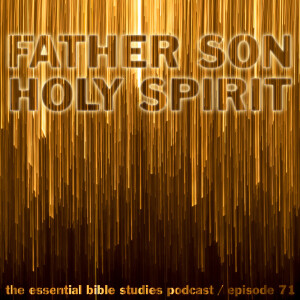
Monday Mar 11, 2024
The Father, Son and Holy Spirit
Monday Mar 11, 2024
Monday Mar 11, 2024
In our continuing studies on the Spirit, Jay Mayock is back to talk with me about the relationship between God the Father, his Son the Lord Jesus Christ and the Holy Spirit. This is popularly known as the Trinity but since that word is not in the Bible we are going to need a little help from some historical creeds to get a definition. From there we open our Bibles, comparing the creeds to what the Scriptures teach us about the Godhead.
Key verse:
“There is one body and one Spirit—just as you were called to the one hope that belongs to your call—one Lord, one faith, one baptism, one God and Father of all, who is over all and through all and in all.” (Ephesians 4:4-6)
Outline:
Introduction
Jewish belief – One God - Monotheism
The popular belief of Christianity - The Trinity
The Trinity defined by the Creeds
Apostle’s Creed (Old Roman)
Nicene Creed
The Trinity would be a radical new teaching for Jews. Where is it taught in the Bible? (Acts 2:22)
The Spirit in relation to the Father and Son
One Spirit… One Lord… One God and Father (Eph. 4:4-6 cp. 1 Cor. 8:6-7).
The Spirit sanctifies (1 Peter 1:2; 2 Thess. 2:13-14; 1 Cor. 6:11) = The word of truth sanctifies (John 17:17; Eph. 5:26)
Thus, the Spirit is important in baptism (Matt. 28:19)
The Spirit of God and Christ in us (Rom. 8:9-11; Gal. 4:6)
Cliff hanger - But what about the passages where the Spirit is personified as the Helper?
Follow us on... Facebook: https://www.facebook.com/essentialbiblestudies Instagram: https://www.instagram.com/essentialbiblestudies/ X: https://x.com/bible_podcast Get it... Get an invite to our Tuesday night Bible Studies at essentialbiblestudies.org Request a free Essential Bible Studies media kit






